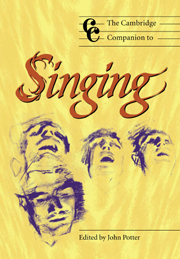Book contents
- Frontmatter
- 1 Introduction: singing at the turn of the century
- Part I Popular traditions
- Part II The voice in the theatre
- Part III Choral music and song
- 9 European art song
- 10 English cathedral choirs in the twentieth century
- 11 Sacred choral music in the United States: an overview
- Part IV Performance practices
- Notes
- Select bibliography
- Index
11 - Sacred choral music in the United States: an overview
from Part III - Choral music and song
Published online by Cambridge University Press: 28 September 2011
- Frontmatter
- 1 Introduction: singing at the turn of the century
- Part I Popular traditions
- Part II The voice in the theatre
- Part III Choral music and song
- 9 European art song
- 10 English cathedral choirs in the twentieth century
- 11 Sacred choral music in the United States: an overview
- Part IV Performance practices
- Notes
- Select bibliography
- Index
Summary
The Continental Congress, which had governed thirteen British colonies while they were becoming the United States of America, adjourned in 1789. The first Congress then took office, elected under the recently adopted Constitution. After fifteen years of subversion, rebellion, war, divided loyalties and conflicting visions, a hard-won consensus had been reached. A new chapter in political and social history was beginning. A new chapter in cultural and artistic life was beginning as well. The young Timothy Dwight, contemplating ‘war's dread confusion’ during the Revolution, envisioned an unprecedented order of peace and prosperity in the emergent country, when
New bards and new sages, unrivaled, shall soar
To fame unextinguished when time is no more
Columbia, Columbia, to glory arise,
The queen of the world, and the child of the skies.
A momentous event in the history of sacred choral music took place shortly before Dwight penned these stirring words. William Billings (1746–1800), a tanner by trade, published his ‘opus one’, The New England Psalm Singer, in 1770, just in time for the Revolution. Approximately a dozen sacred pieces by American composers had been published in the thirteen colonies before Billing's collection appeared. In a single stroke Billings, with his original volume containing 120 new works, increased this repertoire a thousand per cent. Also, in the book's remarkable preface, he issued what amounts to a Declaration of Independence of the American composer. His emphatic and well-argued case for compositional flexibility (he observes that everyone knows what ‘Poetical License’ is, and ‘I don't see why with the same priority there may not be a Musical License’) culminates in his often-quoted exhortation to the composer of the future.
- Type
- Chapter
- Information
- The Cambridge Companion to Singing , pp. 133 - 148Publisher: Cambridge University PressPrint publication year: 2000



